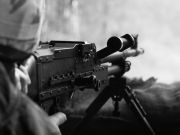Killing in Combat Reduces Soldiers' Likelihood of Alcohol Abuse
Surprisingly, soldiers who have killed in combat are less likely to develop an addiction to alcohol, according to researchers at American University.

From post-traumatic stress disorder (PTSD) to major depressive disorder (MDD), soldiers, sailors, and pilots all display different levels of trauma as they return home from war zones like Iraq and Afghanistan. However, those who have killed in combat are less likely to develop an addiction to alcohol, according to researchers at American University.
For their study published in Drug and Alcohol Dependence, Cristel Russell and her co-contributors surveyed 1,397 anonymous members of a National Guard Infantry Brigade Combat Team 3 months prior to and following its deployment to Iraq in 2005-2006. The researchers requested information about the solders’ behavioral states and alcohol use habits, in addition to details surrounding their service.
From the questionnaire, the study authors discovered alcohol use increased from 70.8% pre-deployment to 80.5% post-deployment. More importantly, the prevalence of alcohol abuse was measured at 8.51% before deployment, yet it surged to 19.15% after deployment.
According to the investigators, the only experience that decreased a soldier’s likelihood of misusing alcohol was killing during combat.
Although this was the first study to compare pre- and post-deployment data, the authors attempted to clarify the trend in a statement provided by American University.
"We reason that a possible explanation may be that soldiers who experience killing during combat become more aware of their own vulnerability to death,” Russell said. “Mortality salience is known to have effects on decisions that people make, including, in our case, the decision to not take risks and abuse alcohol, presumably to live longer.”
Russell urged healthcare providers and researchers to explore more reasons why negative events are not associated with negative behavior, and vice versa. The investigators said they plan to further explore how killing in combat influences soldier behavior.
"Building on these findings, future research should take into account the degree to which individuals are equipped to deal with stressful situations and assess how coping strategies may affect their behavioral response to potentially traumatic events,” Russell said. “There may be ways to promote coping pre- or post-traumatic experiences."